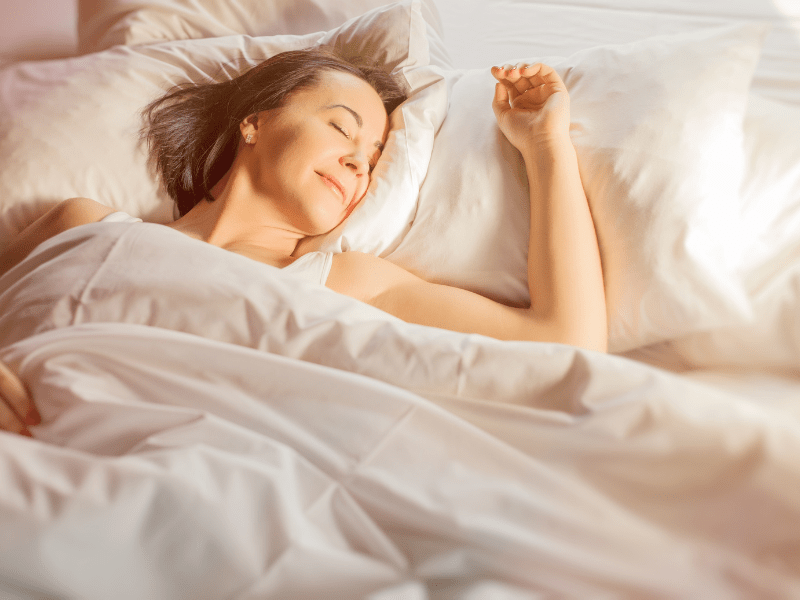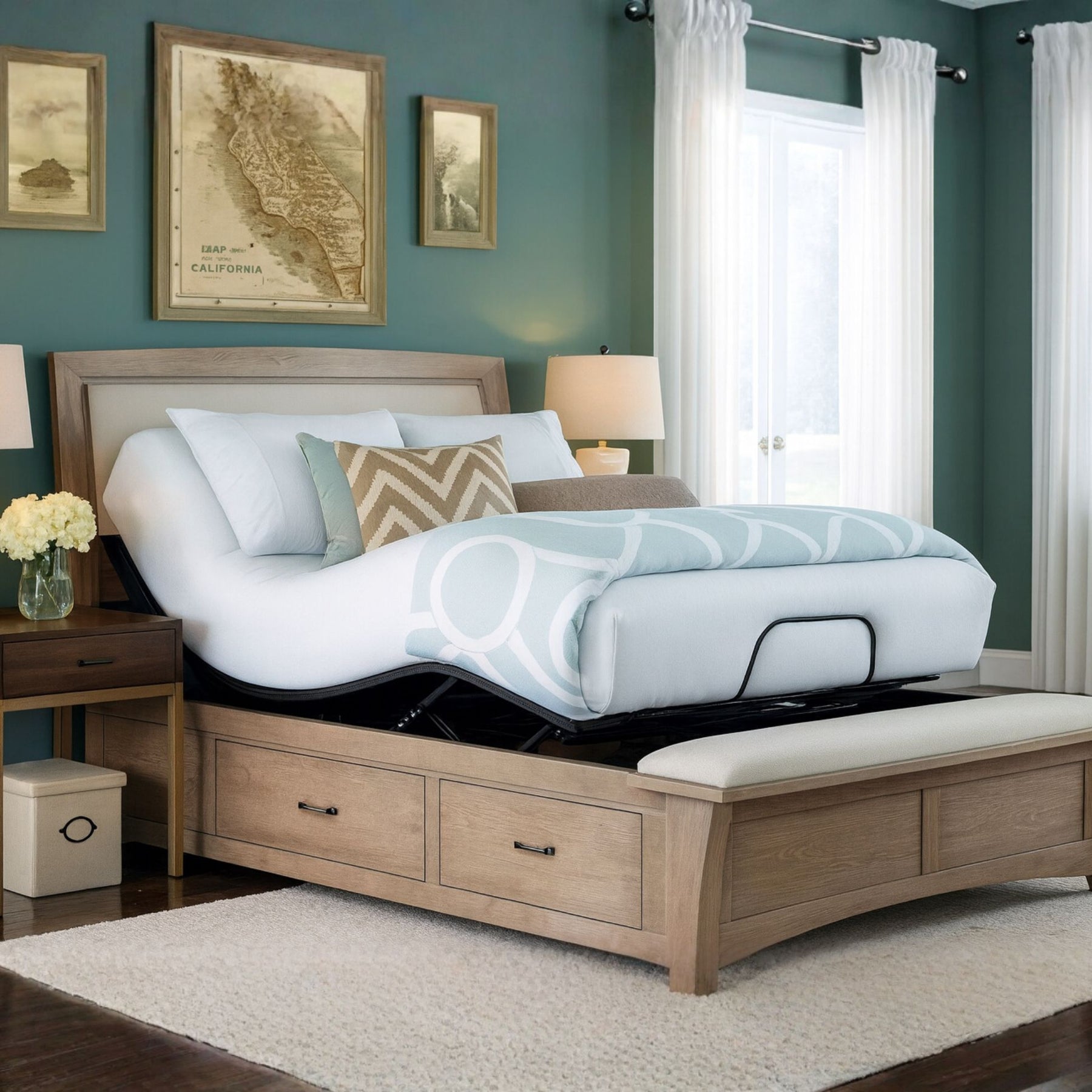Is your sleep tainted by endless tossing and turning? One study shows that 1 in 3 adults are light sleepers, struggling to get the quality rest they need. Our comprehensive guide provides tried-and-tested strategies for a better night's sleep, even if you're typically sensitive to lights or sounds.
Intrigued? Stay with us for expert advice on catching those elusive Z's!
Understanding Your Sleep Needs
To achieve blissful sleep as a light sleeper, it is essential to understand your sleep needs, including the recommended amount of sleep and the importance of creating a personalized sleep plan.
Recommended amount of sleep
You need good sleep for good health. Adults should get at least seven hours of sleep each night. Kids and teens need more because they are growing. Deep sleep is key to staying well.
Try to have 1.5 to 2 hours of deep sleep every night. This helps your brain work its best.
Importance of creating a sleep plan
Making a sleep plan helps you get the right amount of rest. Most adults need 7 to 8 hours each night. This is important for a healthy mind and body. A good sleep plan can help you improve your sleeping habits and patterns.
Poor sleep harms both the number and quality of hours slept. Just like food and exercise, getting enough sleep is key to staying healthy. Plan your bedtime routine to take care of your sleep health!
Creating a Relaxing Bedtime Routine
To create a relaxing bedtime routine, try engaging in activities that help you wind down, such as reading a book, meditating, practicing deep breathing exercises, or doing muscle relaxation techniques.
Tips for winding down
You have to wind down before bed. Here are some tips for creating a calming bedtime routine:
- Start with mild exercise. Light yoga moves can ease your muscles and lessen tension.
- Make sleep hygiene a part of your day. This helps your body and mind ready for sleep.
- Set a sleep plan and stick to it. This makes your body know when it's time to shut down.
- Dim the lights in your home at night. Lower light helps you start the sleep process.
- Limit activities that stop you from winding down, like watching TV or using your phone before bed.
Ways to reduce distractions
To have a peaceful sleep, here are some simple ways to reduce distractions:
- Keep your bedroom quiet by closing doors and windows.
- Use earplugs or white noise machines to block out any unwanted sounds.
- Try using blackout curtains or blinds to keep the room dark and free from outside light.
- Minimize electronic devices in the bedroom to avoid distractions from screens.
- Turn off notifications on your phone or set it to silent mode during bedtime.
- Avoid consuming caffeine or stimulating substances before sleep, as they can interfere with your ability to relax.
Strategies for Better Sleep
Strategies for better sleep include exposing yourself to sunlight, using CBD supplements, blocking out blue light with yellow-tinted glasses, using white noise machines, and sleeping in a dark room.
Exposing yourself to sunlight
Getting exposure to sunlight in the morning can have a positive impact on your sleep. Sunlight helps reset your body's inner "sleep clock" and promotes better sleep quality. By getting natural light, especially in the morning, you can synchronize your body with its internal clock, leading to improved sleep patterns at night. This is because sunlight exposure aids in the production of melatonin, a hormone that plays a crucial role in regulating sleep. When you expose yourself to sunlight in the morning, it can help you fall asleep faster and enjoy longer periods of restful sleep.
So make sure to incorporate some outdoor time into your daily routine for better sleep!
Using CBD supplements
CBD supplements are commonly used to reduce pain and anxiety. They have potential therapeutic properties for treating and managing sleep issues. CBD products may help manage pain, anxiety, and daytime fatigue, which can improve sleep quality.
Research suggests that using CBD supplements may lead to improved sleep for many people. So if you're struggling with sleep problems, incorporating CBD supplements into your routine might be worth considering. However, it is important to note that any sleep medication or supplement is meant to be only a short-term solution. Chronic sleeplessness requires additional treatment to help you sleep better in the long run.
It is also important to ensure the CBD you consume was tested by a third-party and that CBD is legal in your state.
Blocking out blue light with yellow-tinted glasses
Wearing yellow-tinted glasses that block blue light can help improve your sleep. These glasses have been studied as a sleep intervention for different sleep disorders, including insomnia and delayed sleep-phase disorder. By wearing amber-tinted glasses that block blue light for a few hours before bedtime, you can improve the quality of your sleep. Wearing these glasses in the evening may be beneficial for those who experience mood disorders related to sleep.
So if you're a light sleeper looking for better rest, consider blocking out blue light with yellow-tinted glasses.
Using white noise machines
White noise machines can be helpful for light sleepers who have trouble staying asleep due to external sounds. These machines produce white, pink, or brown noise, which can mask disruptive sounds and improve the overall quality of sleep.
By drowning out background noises like traffic or snoring, white noise machines create a consistent sound that helps induce relaxation and promote better sleep. For mattress buyers who are easily awakened by external sounds, incorporating a white noise machine into their bedtime routine may provide the peaceful and uninterrupted rest they need for optimal sleep health.
Sleeping in a dark room
Sleeping in a dark room is important for getting a good night's sleep. When your bedroom is dark, it helps to promote the production of melatonin, which is a hormone that regulates sleep.
Additionally, darkness creates an optimal sleep environment and can improve the quality of your sleep. When you get at least 6 hours of uninterrupted sleep in a dark room, it can enhance your mental focus and alertness during the day.
Bright lights before bed can disrupt your sleep and make it difficult to fall asleep. Remember, ensuring a dark bedroom is important for the production of melatonin, which aids in regulating your sleep.
Expert Recommendations
Experts recommend incorporating regular exercise and stress management techniques into your daily routine to improve sleep quality. Additionally, creating a comfortable bedroom environment with a supportive mattress and implementing natural remedies for insomnia can also help promote better sleep.
Avoiding caffeine and electronics before bed, as well as addressing any parental sleep deprivation, are other important strategies to consider for light sleepers. Take a look at our article on anemia and insomnia for an insight into how the two are linked.
Implementing additional strategies like exercise and stress management
To maximize your chances of getting blissful sleep, it's important to implement additional strategies like exercise and stress management. These techniques can help promote better sleep and improve your overall well-being. Here are some tips to help you get started:
- Incorporate regular exercise into your daily routine. Engaging in physical activity, especially earlier in the day, can help reduce stress levels and promote better sleep.
- Practice stress management techniques such as deep breathing and meditation. These tools can quickly relieve stress and help calm your mind before bedtime.
- Find ways to incorporate relaxation into your evening routine. This could include reading a book, taking a warm bath, or listening to soothing music.
- Create a peaceful sleep environment by removing electronic devices from the bedroom and using blackout curtains or blinds to block out any excess light that could disrupt your sleep.
- Establish a consistent sleep schedule by going to bed and waking up at the same time every day, even on weekends.
Importance of a comfortable mattress and bedroom environment
A comfortable mattress and a relaxing bedroom environment are crucial for getting a good night's sleep. Studies have shown that people simply sleep better when their bedroom is optimized for restful sleep.
Sleep hygiene, which includes your sleep environment and behavior, plays a significant role in both the quantity and quality of your sleep. Investing in a comfortable mattress that supports your body can greatly improve your overall sleep experience. Additionally, creating a dark room by using blackout curtains or blinds can help promote better sleep by blocking out external light sources. So, if you're looking to optimize your sleep, don't underestimate the importance of having a comfortable mattress and creating an ideal bedroom environment.
Natural remedies for insomnia
If you have trouble sleeping, there are natural remedies that can help. Here are some options:
- Warm milk: Experts recommend drinking warm milk before bed to promote sleep. It contains tryptophan, an amino acid that helps produce serotonin and melatonin, hormones that regulate sleep.
- Chamomile tea: Drinking chamomile tea before bed can have a calming effect on the body and mind. It contains apigenin, an antioxidant that helps promote sleepiness.
- Tart cherry juice: Tart cherries are rich in melatonin, a hormone that regulates the sleep-wake cycle. Drinking tart cherry juice before bed may help improve sleep quality.
- Diet changes: Certain foods can impact your sleep. Avoiding heavy meals, spicy foods, and caffeine in the evening can promote better sleep.
- Lifestyle changes: Establishing a bedtime routine and creating a relaxing environment in your bedroom can improve your chances of falling asleep easily. Limiting exposure to screens and engaging in relaxing activities like reading or taking a bath can also help.
Avoiding caffeine and electronics before bed
Drinking caffeine too close to bedtime can keep you awake at night. It's best to avoid consuming coffee, tea, or other caffeinated beverages in the evening if you want a good night's sleep. Also, try to stay away from electronics like computers and smartphones before bed because the blue light they emit can interfere with your sleep quality.
So, instead of scrolling through your phone or having a cup of coffee, opt for relaxing activities like reading a book or taking a warm bath to prepare your body and mind for restful sleep.
The impact of parental sleep deprivation
Parental sleep deprivation can have a significant impact on both physical and mental health. Lack of sleep can leave parents feeling exhausted, drowsy, and unable to concentrate. This can lead to impaired performance in daily activities and even increase the risk of accidents.
Chronic sleep deprivation can also contribute to the development of chronic health problems such as heart disease and diabetes. Additionally, sleep deprivation can negatively affect brain function, immune health, and memory.
It is important for parents to prioritize their sleep and seek support if they are experiencing ongoing fatigue due to lack of restful nights.
Conclusion
In conclusion, these tips and tricks can help light sleepers get a restful night's sleep. By focusing on relaxation before bed, creating a comfortable sleep environment, and implementing strategies like daily sunlight exposure and avoiding caffeine, light sleepers can improve their sleep quality and overall well-being.
With a little effort and consistency, blissful sleep is within reach for everyone.
FAQs
1. What can I do to improve my sleep if I'm a light sleeper?
Improving sleep as a light sleeper can be done by establishing a consistent bedtime routine, creating a comfortable sleep environment, practicing relaxation techniques before bed, and avoiding stimulating activities or screens close to bedtime.
2. Will using white noise machines or earplugs help me sleep better as a light sleeper?
Using white noise machines or earplugs can help mask disruptive noises and promote better sleep for light sleepers by creating a soothing background sound that drowns out other disturbances.
3. Should I avoid caffeine if I'm a light sleeper?
Avoiding caffeine is recommended for light sleepers as it is known to interfere with the quality of sleep. It's best to limit the consumption of coffee, tea, soda, and other caffeinated drinks, especially in the hours leading up to bedtime.
4. Can reducing exposure to bright lights before bed benefit my sleep as a light sleeper?
Reducing exposure to bright lights before bed can aid in improving your quality of sleep as this helps signal the body that it's time for rest and promotes the production of melatonin, the hormone responsible for regulating our internal clock.
5. Are there any natural remedies that can help me achieve blissful sleep if I'm a light sleeper?
Yes, some natural remedies such as drinking chamomile tea before bed, using lavender essential oil on pillows or diffusers, and practicing deep breathing exercises are known to promote relaxation and support better quality of sleep in individuals who are light sleepers.






















